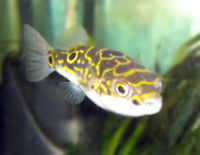Figure Eight Pufferfish (Tetraodon biocellatus)
From The Aquarium Wiki
Figure Eight Pufferfish
Tetraodon biocellatus
76 Litres (20 US G.)
5.1-7.6cm (2-3 ")
7.8 - 8.3
24 -28 °C (75.2-82.4°F)
8-18 °d
2:3 M:F
5-15 years
Family
Tetraodontidae
Contents
Additional names
- Figure Eight Pufferfish, Eyespot Pufferfish, F8 Puffer
Origin
|
|
This section requires expansion with: Location where this animal is found in the wild. |
Sexing
- Very difficult to sex visually.
Tank compatibility
- Best kept in species tanks as this fish can be aggressive and will fin-nip and attack tank mates. While young they may tolerate their own species but as they grow and mature this becomes less likely.
Diet
- Must be fed with molluscs and snails in order to make sure the Puffer's beak will not become over-grown. Feed snails such as Ramshorn Snails and baby Apple Snails, can also be supplemented with Ghost Shrimp and bloodworms.
Feeding regime
- Feed young specimen once a day. When they grow older and bigger to approx 10.2cm (4") only feed once every 2 or 3 days to prevent buildup of fats in the body.
Environment Specifics
- Although often marketed as a freshwater Puffer, this fish does best in brackish conditions with an SG of 1.005 - 1.008. Hiding places and dense decor is appreciated as these are curious fish. Can be transferred to either marine (saltwater) or freshwater environments after acclimatisation, but prefers low-end brackish conditions.
- These are very messy fish so their tank should be mature, well filtered and spacious.
Behaviour
- An aggressive active predator.
Identification
- The markings on this fish can vary, they have a short rounded body with a white belly and the base colour of the top half varies from brown to yellow to green covered with yellow lines and dark spots with yellow outlines. Also there are a few black spots that are outlined in yellow on the tail, body and nose.
Pictures
External links
- Fishbase (Mirrors:
 )
)
